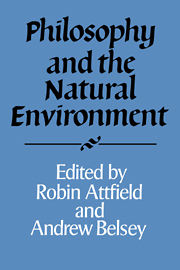Book contents
- Frontmatter
- Contents
- Preface
- Notes on Contributors
- Introduction
- Value in Nature and the Nature of Value
- Ecology and the Ethics of Environmental Restoration
- Rehabilitating Nature and Making Nature Habitable
- Personalistic Organicism: Paradox or Paradigm?
- Values, Reasons and the Environment
- Awe and Humility: Intrinsic Value in Nature. Beyond an Earthbound Environmental Ethics
- The End of Anthropocentrism?
- Global Religion
- Kant and the Moral Considerability of Non-Rational Beings
- The Idea of the Environment
- Chaos and Order, Environment and Anarchy
- Natural Capital
- Some Philosophical Assessments of Environmental Disobedience
- Global Environmental Justice
- Environmental and Medical Bioethics in Late Modernity: Anthony Giddens, Genetic Engineering and the Post-Modern State
- Highlights and Connections
- Bibliography
- Index
Introduction
Published online by Cambridge University Press: 19 October 2009
- Frontmatter
- Contents
- Preface
- Notes on Contributors
- Introduction
- Value in Nature and the Nature of Value
- Ecology and the Ethics of Environmental Restoration
- Rehabilitating Nature and Making Nature Habitable
- Personalistic Organicism: Paradox or Paradigm?
- Values, Reasons and the Environment
- Awe and Humility: Intrinsic Value in Nature. Beyond an Earthbound Environmental Ethics
- The End of Anthropocentrism?
- Global Religion
- Kant and the Moral Considerability of Non-Rational Beings
- The Idea of the Environment
- Chaos and Order, Environment and Anarchy
- Natural Capital
- Some Philosophical Assessments of Environmental Disobedience
- Global Environmental Justice
- Environmental and Medical Bioethics in Late Modernity: Anthony Giddens, Genetic Engineering and the Post-Modern State
- Highlights and Connections
- Bibliography
- Index
Summary
The philosophy of nature is at least as old as the presocratics, but has undergone comparative neglect in philosophical circles this century until recently, at least in English-speaking lands. The philosophy of science concentrates on scientific concepts and methods and the interpretation of scientific theories, rather than on the concept of nature itself, while, with significant exceptions (e.g., Hepburn, 1984), aesthetics focuses on the experience of art rather than on that of nature. Meanwhile moral, political and social philosophy has focused on the social environment, but the natural environment has often been lost to view. Indeed it has been argued, with some cogency, that mainstream Western metaphysics, epistemology and ethics have historically been inhospitable to conservation, to environmentalism and to their values (see Hargrove, 1989; Attfield, 1994a).
All this, however, is beginning to change, in Britain as well as overseas. Environmental ethicists have for some years now been arguing for revisions of ethical theory; the Society for Applied Philosophy held its 1986 Annual Conference on environmental and animal welfare themes; and a series of public seminars of that Society on environmental values continues to be held at the University of Lancaster, where the journal Environmental Values is also edited. Yet the 1993 Cardiff Conference of the Royal Institute of Philosophy was the first large philosophical gathering in Britain held to consider the themes of nature, the natural environment, and related issues of value, ethics and society.
- Type
- Chapter
- Information
- Philosophy and the Natural Environment , pp. 1 - 12Publisher: Cambridge University PressPrint publication year: 1994
- 2
- Cited by

